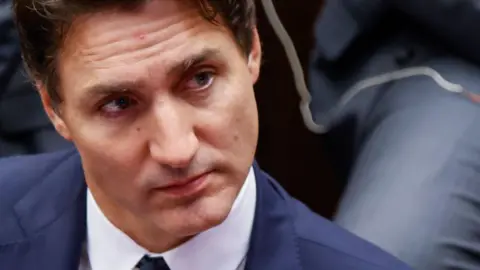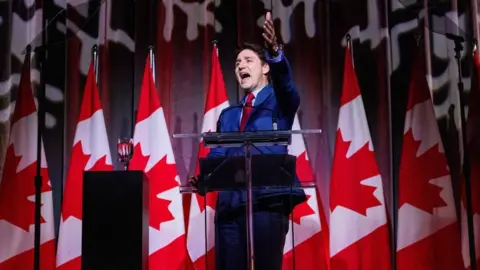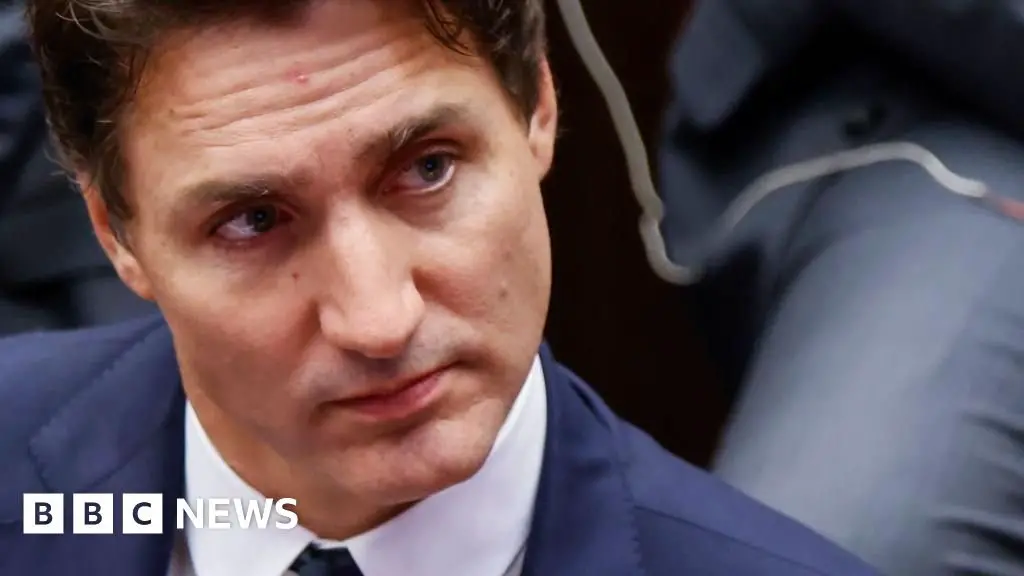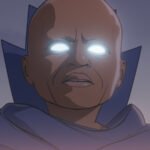 Getty Images
Getty ImagesIt was one of the worst weeks of his political career, and Canadian Prime Minister Justin Trudeau kicked off the season.
At the Liberal Party’s annual holiday meeting, Trudeau put on his party face, although he was caught off guard the day before when one of his most trusted allies, Finance Minister Chrystia Freeland, resigned just hours before her scheduled economic statement in Parliament.
But even as some members of his own party called on him to leave, the prime minister struck a determined, defiant tone as he addressed party loyalists in his dark blue suit and tie.
He alluded to his “difficult” week and compared it to a family argument.
He spoke of being “bold” and “ambitious” in the face of adversity and sharply criticized his political rival Pierre Poilievre, leader of the opposition Conservative Party of Canada.
Experts noted afterward that it sounded a lot like a campaign speech and that Trudeau appeared to be getting involved despite the recent political turmoil.
That stance didn’t change Friday, even after the leader of the country’s progressive New Democratic Party (NDP), Jagmeet Singh, said he would table a motion to oust Trudeau’s government in the new year. It was the NDP’s support that had kept the Liberals in power. Now an election seems imminent.
Still, Trudeau has given no indication that he will resign soon, although he has reportedly told his party colleagues that he will take time during the winter holidays to think about what to do.
Political observers say Trudeau has often shown a touch of defiance when under pressure, which has helped him weather a number of controversies during his nine years in power.
And he has often been underestimated, such as when he won majority government in 2015 at the age of 44, despite being portrayed as something of a dilettante by his political opponents.
But as pressure mounts on him to step down, some of these experts say he may need a new strategy.
 Reuters
ReutersHe proves his doubters wrong
When Trudeau first ran for prime minister, three words followed him: “Just not ready.”
That phrase was the slogan of an attack ad that ran repeatedly across the country as he sought to unseat incumbent Prime Minister Stephen Harper, a Conservative who had been in power since 2004.
It expressed the general criticism he faced at the time about his young age, his relative lack of experience and his winding path to politics.
Trudeau “kind of wandered” in his early life before becoming a drama teacher in Vancouver, said Canadian historian Raymond Blake, who appears isolated as the well-known and wealthy son of former Prime Minister Pierre Elliott Trudeau.
But not long after entering politics, Trudeau adopted a combative stance.
Some say he learned this trait from his father, who was known for his charismatic but combative leadership style and who is famous for his catchphrase “Just watch me,” which he said flippantly to a reporter at the height of his political career during a crisis.
“His father had the impression of being a really resilient, very tough politician,” said Lawrence Martin, a longtime Canadian political columnist based in Washington, D.C.
The younger Trudeau defied the odds himself by delivering a historic victory for his Liberal Party, leading it from third place in Parliament to a majority mandate in his first federal election.
“It gives him a feeling that he can overcome big obstacles,” Martin said, adding that Trudeau operates politically with “a great deal of confidence.”
Trudeau’s path to power became bumpy after he took office as he was embroiled in a series of political scandals.
In his first term, Justice Minister Jody Wilson-Raybould – the first Indigenous woman to hold the post – resigned over attempts at interference and “veiled threats” from senior government officials seeking legal favors for a company facing a corruption trial.
As he campaigned for a second term in 2019, Trudeau’s re-election campaign was rocked by published images showing him at least three times as a younger man in brownface.
And a year later, in 2020, Trudeau faced another ethics scandal involving a potentially large government contract for a youth charity that had worked with members of the Trudeau family.
But despite every setback, Trudeau retained power. He won re-election twice, making him the longest-serving leader of his G7 colleagues.
“Trudeau has survived so much,” Prof. Blake said, noting that his political successes and leadership have won the loyalty of many in his party despite the scandals.
Is Freeland’s departure a turning point?
Although Trudeau has weathered many storms, there are signs his time may be up.
For one thing, history is not on his side. Only one Canadian prime minister, Sir John A. MacDonald – the country’s first – served four consecutive terms.
Trudeau is also working against declining popularity. An Ipsos poll in September found that about two-thirds of Canadians oppose him. Only 26% of respondents said Trudeau would be their first candidate for prime minister, putting him 19 points behind Conservative leader Poilievre.
And then there is the slowly dwindling support within Trudeau’s own party. So far, at least 18 Liberal MPs have called for their leader to resign.
“He’s delusional if he thinks we can continue like this,” New Brunswick MP Wayne Long told reporters this week.
“It is unfair to us MPs, it is unfair to the ministers and above all unfair to the country. We need to take a new direction and restart.”
According to Long, who led the push to remove Trudeau, up to 50 of the 153 Liberal MPs want him to resign immediately. About that many are Trudeau loyalists, he said, and the rest are undecided.
“There are still some party loyalists who like him and, you know, still want to support him,” Mr. Martin said. the DC-based columnist. “But if there was a secret vote by the Liberal caucus on whether or not he should stay in office, he would be soundly defeated.”
His contempt for his political opponent Poilievre also appears to be driving the prime minister to stay, Mr. Martin noted.
“He doesn’t want to give in and he wants to take on Pierre Poilievre, who he detests,” he said.
Trudeau’s dogged persistence in the face of a bleak political forecast has drawn comparisons to outgoing U.S. President Joe Biden, who only abandoned his candidacy months before the November election amid mounting internal pressure.
Prof Blake said Trudeau’s legacy, like Biden’s, will depend on how he exits. Fighting a losing battle, he said, could leave Trudeau “a permanent scar.” But the prime minister has a remarkable ability to survive, he noted.
“He was a survivor and he didn’t do what was normal. Will normal – whatever it may be – prevail this time? Maybe, but I’m not convinced.”
Trudeau’s dilemma is also similar to that of his father, who won three straight elections and won a fourth after being out of power for less than a year.
But in 1984, more than 15 years after he first became prime minister, the elder Trudeau, like his current son, faced poor polls. It seemed clear that he would not win the next election if he remained in office. He decided to resign, telling the public that he made this decision after walking in a snowstorm in Ottawa.
Since then, the term “walk in the snow” has become synonymous with political resignation in Canada. It remains to be seen whether Trudeau will take his own walk this Christmas.






